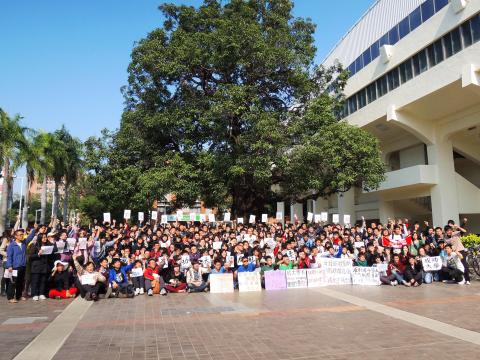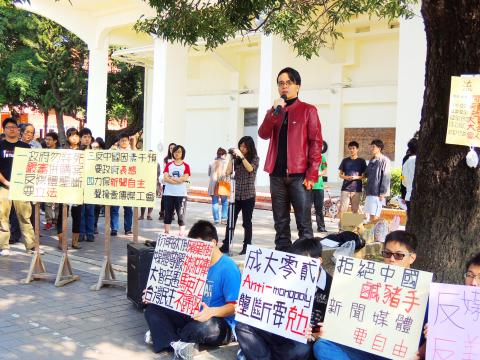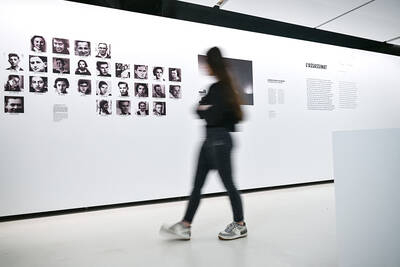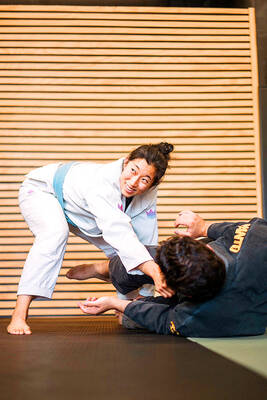People are being forced to step up and fight to save the nation against a media monopoly, the so-called “media monster” that could significantly jeopardize Taiwan’s precious democracy and freedom of speech.
Students at universities like National Cheng Kung University (NCKU) and Kun Shan University (KSU) are urging students at universities in southern Taiwan to stand up and voice their opposition to media monopolization. They hope young people will show concern for matters of significant import and come together to bring about change.
NCKU’s 02 Group, whose name is a phonetic translation of “protest” in Hoklo (commonly known as Taiwanese), the Student Union and the United League of Student Unions all gathered at the main gate of the university’s Kuangfu campus to hold a soapbox event to speak out against media monopolization. Members and representatives of every student organization were invited to hold discussions. A student band named Stethoscope performed a song, “Behemoth,” that was written especially for the event, and at the end everyone came together for a group photo commemorating the anti-media monopoly event.

Photo: Meng Ching-tzu, Liberty Times
照片:自由時報記者孟慶慈
Chang Chih-ling, a member of 02 Group, says that people are not willing to let the media become a tool of those with power and authority, and will not allow the truth to be buried by single voice, so that is why they are fighting against the “media monster,” because it would blind Taiwanese from seeing their future. The students hope that by taking action the government will finally start taking the issue seriously, and they have four requests: the government should stop playing dead and seriously review the Next Media Group buyout merger; legislation against media monopolization must be passed; the government must voice opposition to Chinese interference; and the government must strive to protect freedom of the press and publicly support Taiwan’s Next Media unions.
Students from KSU’s Department of Public Relations and Advertising also organized an event — “Anti-media monopoly, I’m protecting Taiwan at KSU” — on Facebook, during which students and teachers were invited to gather in front of the school’s Library and Information Center at noon daily from Dec. 10 to Dec. 14, to offer their opinions and participate in a group photo activity in which individual cards were held up that spelled out in Chinese, “Anti-media monopoly, defending freedom of the press. I’m protecting Taiwan at KSU.”
(Liberty Times, Translated by Kyle Jeffcoat)

Photo: Meng Ching-tzu, Liberty Times
照片:自由時報記者孟慶慈
媒體巨獸將危及台灣珍貴的民主和言論自由,反媒體壟斷,自己的國家自己救!
成大、崑山科大等學生發起反對媒體壟斷活動,號召身處南台灣的大學生、青年人站出來發聲,關心該關心的大事,加入更多改變的力量。
成大零貳社、學生會、社聯會等社團,十二月十一日中午在成大光復校區大門口,針對反媒體壟斷議題舉行「校園肥皂箱」活動,邀請各社團學生或代表,共同宣導議題,學生樂團「白袍與聽診器」的發表「巨獸」創作,大家在光復校區擺攤,提供反媒體壟斷照片拍攝集氣。
零貳社成員張芷菱表示,大家不願意媒體成為權力者的工具,更不願真相被蒙蔽到僅剩一種聲音,因此要反對媒體巨獸,它會盲目了台灣的未來;學生希望藉由實際行動,監督政府重視此一議題,也提出四大訴求,一、政府不要裝死,要嚴審併購案。二、反媒體壟斷,要立法。三、反中國因素干預,要政府表態。四、力保新聞自主,聲援壹傳媒工會。
崑山科大公共關係暨廣告系學生則在臉書發起「反對媒體壟斷,我在崑山科技大學守護台灣」活動,邀師生十二月十日至十四日到圖書資訊館前,參與現「生」說法,讓我們一起發「聲」照片串聯活動,與「反對媒體壟斷.捍衛新聞自由.我在崑山科技大學守護台灣」字卡合照表達立場。
(自由時報記者孟慶慈)

Historians are rethinking the way the Holocaust is being presented in museums as the world marks the 80th anniversary of the liberation of the last Nazi concentration camps this month. Shocking images of the mass killings of Jews were “used massively at the end of World War II to show the violence of the Nazis,” historian Tal Bruttmann, a specialist on the Holocaust, told AFP. But in doing so “we kind of lost sight of the fact that is not normal to show” such graphic scenes of mass murder, of people being humiliated and dehumanized, he said. Up to this

When people listen to music today, they typically use streaming services like YouTube or Spotify. However, traditional formats like vinyl records have regained popularity in recent times. Vinyl records are circular discs that store music in grooves on their surfaces and are played on a turntable. As the turntable’s needle runs along these grooves, it picks up vibrations and translates them into sound. The history of vinyl records dates back to the late 1800s, but material and technological challenges delayed mass production until the 1950s. Despite early versions having short playtimes and poor sound quality, vinyl records introduced a new era

A: Brazilian jiu-jitsu, known as “BJJ,” has become more and more popular. Even Hollywood stars like Halle Berry and Tom Hardy are obsessed with it. B: Some Asian stars, such as Taiwanese actor Eddie Peng and South Korean actor Lee Joon-gi, have also practiced this martial art. A: BJJ is not just a martial art, but also a combat sport. B: I’ve always wanted to try it, but I’m worried about getting injured. A: Diana Wang, a US doctor of physical therapy, is holding a BJJ seminar at PMA Brazilian Jiu-jitsu in Taipei Friday night. Let’s go check out how we

A: Actually, Brazilian jiu-jitsu is particularly good for small people like you. B: Really? How so? A: According to Diana Wang, a US doctor of physical therapy, the BJJ’s purpose is to help smaller, weaker people defend themselves by using various techniques, such as leverage. B: That sounds interesting. What time does Dr Wang’s BJJ seminar begin tonight? A: The event is scheduled for 7:30pm at PMA Brazilian Jiu-jitsu in Taipei. Admission is free, but donations are welcome. A: 其實你的個子比較小,很適合練巴西柔術呢。 B: 真的嗎?為什麼? A: 據美國理療醫師王幼瑞博士說,巴西柔術的概念是讓弱小的人,也能利用槓桿作用等技巧防身。 B: 真有趣,王醫師的巴柔研討會幾點開始? A: 今晚7點半在「台北巴柔運動館」,免費入場自由樂捐唷! (By Eddy Chang, Taipei Times/台北時報張迪)